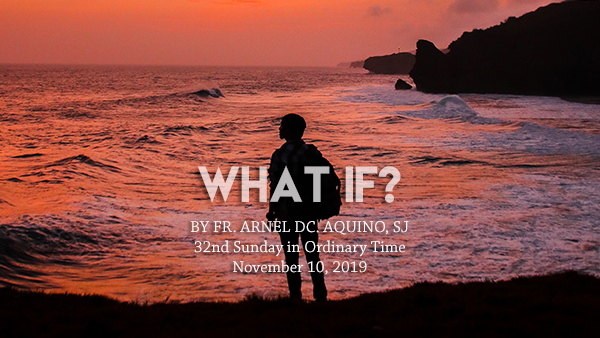


Fr. Arnel dC. Aquino, SJ
32nd Sunday in Ordinary Time
November 10, 2019
What if NASA scientists spotted an asteroid 10km wide, hurtling towards Earth, at 30km/second, the average asteroid speed? And what if the scientists said it would hit us in two months, no way to slow it down or missile-blast it to smaller pieces? And what if the asteroid would hit land instead of water, and set fire to everything it hit and around it, setting off forest fires and shooting the temperature up to oven-heat? Mix all that smoke and ashes with the dust from the impact, and they rise into Earth’s orbit to stay there for a year or so, screening off the sun from our planet. Without sunlight, flora and fauna would die, including us. So, if all that were to happen two months from now, imagine the effects it would have on everything that we do and have and know today; we, powerless Earthlings. Because if we were sure to die together just when 2020 came around the corner, would it still matter how many likes or shares we got on social media today, for example? Would it still matter how much more money we make than the next guy? Would we still want to have the last word on Facebook, the last word on politics, the last word even on religion? And what about the revenge we were planning against our detractors? I was thinking, if we were sure everything and everyone would end in January altogether, it could actually awaken us to two fundamental things we often took for granted: (a) what a waste of time and strength it was to have invested so much on things we thought we couldn’t live without, and (b) how worthwhile it had been to have had relationships with real people, in real mutual presence, in real time, with real love.
The Sadducees were a religious sect of aristocrats, rich men. They exerted enormous influence on the Temple and the society. They were very pious, very religious men. But they didn’t believe in the resurrection. They didn’t believe in any form of afterlife; in fact, for them, the soul was not immortal. So, they didn’t believe that there were rewards or punishments after death either. Interestingly, the Sadducees triggered scorn and hatred from people. For they were supercilious in religious practice, over-protective of their wealth, haughty in manner, and sycophantic to Roman authorities. If a powerful aristocrat didn’t believe in reward and punishment after death, he must have thought that his present fortune of being a rich and powerful man was already God’s blessing to him, and all who fell below his status were a cursed and punished lot. No wonder the Sadducean pride.
Then Jesus of Nazareth came around, talking about an afterlife which must’ve both fascinated and confused the Sadducees. So, they “sample-tested” his concept of the resurrection with the question of marriage-widowhood-remarriage. If a woman were widowed 7 times and remarried 6 times, whose wife would she be when she and all her exes rose again? Well, we no longer need to commit ourselves to “marriage” in the Resurrection, Jesus said. God’s very presence would surpass and far outweigh, and dwarf any earth-bound relationships we ever had, including marriage. God Himself would be the fulfillment of everything we ever sought and wished for all our lives. Best of all, because our sense of fulfillment would be eternal, we’d then be so much kinder to each other, much more forgiving, more loving to one other in our resurrection, than we’d ever been on earth. Jesus actually talked about that all the time: the coming of the Kingdom of God, the consummation of the Reign of God, the Resurrection.
Now we’re not certain if an asteroid will ever hit Earth. But two things we are certain of: (a) that all of us will die, and (b) that all of us will rise again. After all, our faith and religion are founded on the Resurrection. We are an “Easter people.” So whatever good we do in this life, we do because we know that last breath does not mean last life. If there were no life after death, no eternity, we would’ve long fallen into a huge crater of inescapable despair. “What am I doing all these good things for? Why go to Church and worship? Why believe in justice, fairness, and love for the poor if death ended everything I knew and had? Why be a priest at all, for heaven’s sake? Why not just live it up since it’ll end in nothingness anyway?”
We Pinoys, we talk about ghosts a lot, and spirits, and lately, the devil and exorcism (God knows why). We practice plenty of superstitions about wakes and funerals, and know well what we should and shouldn’t do when someone dies. We also know what we want when we die, to the last detail: what we’re going to wear, the priest who’ll say mass, the songs we want sung. But it often ends there, in our death. Why do we not go further and talk about the resurrection, our resurrection, let alone ask questions about it? Why do we not tell stories of what it might be like, no matter how fantastical—and how it might feel, whom we might meet again? If our faith and religion stand on the bedrock of the Resurrection, shouldn’t we have long begun exploring what it’s like—even by simply imagining it, asking about it, talking about it?
What if a good way to start a conversation about our Resurrection…is that asteroid!